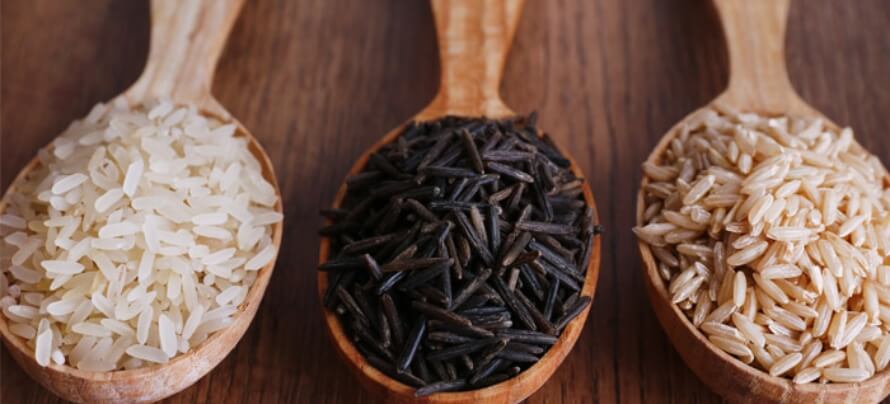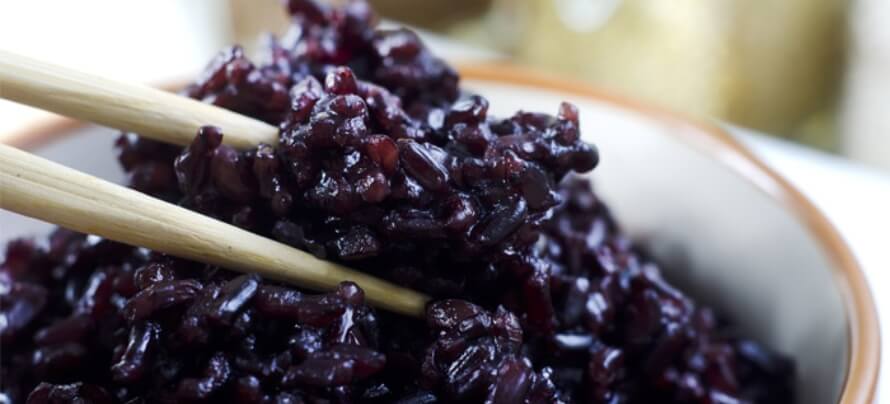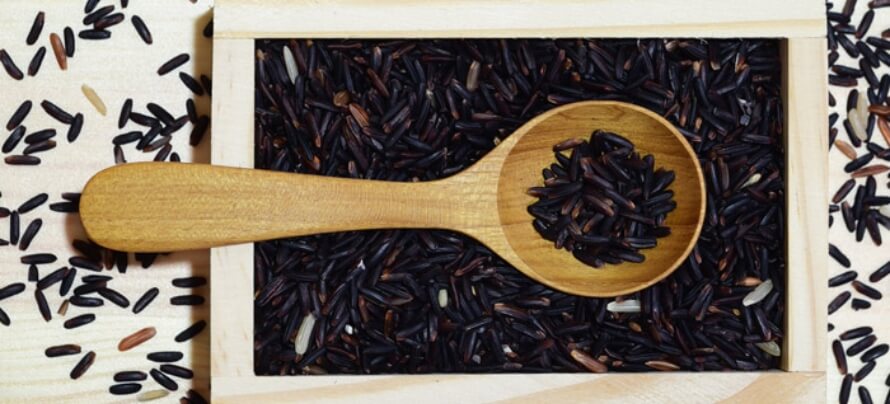Key Takeaways
- Black rice is a lesser known variety of rice that contains similar macros to white and brown rice, with about the same fiber as brown rice thanks to being a whole grain.
- It’s especially rich in antioxidants, which can help reduce inflammation and oxidative stress, and may improve memory and even fight cancer.
- While black rice is often proposed as a “superfood,” and it is healthy, it may not be as special as many people claim.
Haven’t heard of black rice? It’s not surprising really. It’s much less common than its brown and white relatives.
It’s also called purple rice due to its color after cooking, or even “forbidden rice.”
Ancient Chinese lore claims black rice was reserved solely for the emperor and the royal family, due to its nutritional profile and healing abilities. Back in those days, if you were caught eating it without permission, your life was in jeopardy!
Was the emperor right when he decided to keep it all to himself? Is black rice worth tracking down for its healthful properties, or is it just like any other form of rice?
Let’s see . . .
Table of Contents
+
Black Rice Is a Healthy Source of Carbs

Black rice, like brown rice, is a whole grain. White rice, on the other hand, has its hull removed, making it lower in certain nutrients than its whole grain counterparts.
For example, if you’re looking for fiber, brown rice is a better option. But is black rice even better?
Here’s what a typical serving (one quarter cup, uncooked) of black rice provides:
- 160 calories
- 1 g fat
- 34 g carbohydrates
- 2 g dietary fiber
- 1 g sugar
- 5 g protein
- No saturated fat
- No cholesterol
Let’s compare that with brown and white rice.
Brown rice has 170 calories, 35 g of carbs, 4 g of protein, and 2 g of fiber, while white rice has 150 calories, 35 g of carbs, 3 g of protein, and no fiber.
As you can see, black rice is very similar to the other kinds of rice in terms of macronutrient composition. However, it does contain more fiber than white rice and slightly more protein per serving.
Summary: Black rice is very similar to brown and white rice in terms of macronutrient composition, although it has slightly more protein and fiber than white rice.
Black Rice Is a Rich Source of Antioxidants
Where black rice really puts itself ahead of either brown or white rice is its antioxidant content.
Antioxidants can reduce oxidative damage, which is a major factor in the development of many diseases and chronic conditions including aging, cardiovascular disease, cancer, and neurodegenerative disorders.
An analysis of 12 different varieties of rice found the antioxidant content of black rice was about six times higher than brown or white rice.
Other studies have found similar results, putting black rice at the top of the heap.
Summary: Black rice contains far more antioxidants than either brown or white rice, which may make it more effective at fighting diseases and aging.
Black Rice Fights Inflammation
While inflammation is a healthy bodily response to foreign bacteria and viruses (and even exercise), sometimes it can get out of control.
Chronic inflammation plays a role in many diseases, including type 2 diabetes, cancer, and heart disease.
Researchers from the University of Suwon in South Korea carried out animal tests on both black rice bran and brown rice bran to determine their effectiveness against skin inflammation.
While the brown rice bran didn’t suppress inflammation, the black rice bran did. As a result, the researchers suggested black rice may be a useful “therapeutic agent for the treatment and prevention of diseases associated with chronic inflammation.”
Another study, published in the Journal of International Immunopharmacology, found a potent antioxidant in black rice called cyanidin-3-O-beta-D-glycoside (C3G) is highly effective at suppressing inflammation in the body.
Of course, you won’t fight chronic inflammation by eating rice alone. Not being overweight, getting enough sleep, exercising, and eating plenty of fruits and vegetables all play a role.
Summary: Black rice is anti-inflammatory, making it a healthy part of a balanced diet and lifestyle.
Black Rice Could Help With Weight Management

Another supposed health benefit of black rice is helping people reach or maintain a healthy weight.
Does the science back up these claims?
In a 2008 study at the Department of Food and Nutrition at Hanyang University Korea, researchers divided 40 overweight adult women into two groups for a six week study.
One group ate meals containing white rice, while the others ate almost identical meals – the only difference being the white rice was replaced by a mix of black and brown.
Even though both groups had significant reductions in weight, BMI and body fat, the brown/black rice group enjoyed greater reductions in all three areas compared with the white rice group.
Of course, this is just one study. And it featured a mix of black and brown rice.
This makes it difficult to say if black rice is responsible for the extra weight loss, or if it’s simply down to the high fiber content of both black and brown rice.
However, this study (and many others) highlight the importance of fiber in maintaining a healthy weight. Because our bodies digest fiber slowly, high fiber foods keep us fuller for longer, preventing hunger, and cravings.
Summary: Black rice contains fiber, which can help keep you more satisfied and may contribute to weight loss if it helps you eat fewer calories than you burn.
Black Rice May Improve Heart Health
It goes without saying that keeping a healthy heart is vital for overall health.
The Centers for Disease Control and Prevention states that heart disease is the leading cause of death in the US for both men and women, accounting for one in every four deaths.
Can black rice play a role in a healthier heart?
Some studies seem to suggest it can.
One such study, featured in the Journal of Nutrition, found that black rice decreases atherosclerotic plaque in the arteries.
When this plaque builds up, it causes the arteries to harden and become blocked.
It’s a major risk factor for both heart attack and stroke. In this particular study, male rabbits were injected with high levels of cholesterol in order to cause this plaque formation. They were then divided into five groups, four of which were fed high cholesterol diets, one without rice and the others with various types of rice, including black.
The plaque was 50% lower in rabbits fed black rice (or red rice) than in those fed with white rice. Researchers conclude that the antioxidants in black rice may play a role in reducing atherosclerosis.
These results can’t be extrapolated to humans, but it does indicate black rice might help protect your heart and arteries.
Summary: Animal studies suggest black rice can reduce the amount of plaque in the arteries, improving heart health. More research is needed before we can say this is true in humans.
Black Rice May Improve Liver Health
The liver is one of our biggest organs, responsible for processing many nutrients from our food into materials that our body can use and regulating hormones.
According to some studies, black rice can play a role in liver health.
In 2012, the journal Nutrition & Metabolism published a study that examined the effects of black rice extract on non-alcoholic fatty liver disease.
This common condition, which affects up to 90 million Americans (even children), happens when fatty deposits form in the liver.
Mice with fatty liver disease were fed either a normal fat diet, high fat diet, or a high fat diet supplemented with black rice extract.
After seven weeks, the researchers found that those mice fed the diet with black rice had improved blood lipid levels and significantly lower levels of triglycerides and total cholesterol than the others.
From this work, researchers were led to believe that black rice may play a role in preventing fatty liver disease.
It’s a bit early to go that far, but black rice could help you maintain a healthy weight as part of a healthy diet. Maintaining a healthy weight is the most important thing you can do to avoid fatty liver disease.
Summary: Animal studies show black rice can improve lipid levels in the blood, possibly reducing the risk of fatty liver disease, but more research is needed.
Black Rice Might Improve Cognitive Function

Black rice contains anthocyanins, a type of antioxidant flavonoid that gives certain plants their dark color. Some of these foods rich in anthocyanins are blueberries, raspberries, and black soybeans.
Scientists believe anthocyanins are responsible for various health benefits including reducing blood pressure and arterial stiffness, two cardiovascular disease risk factors.
In fact, one study conducted by scientists at the University of East Anglia found that a high intake of anthocyanins was associated with a reduced risk of heart attack.
Anthocyanins and other antioxidants have also been linked with brain function.
Some researchers believe oxidative stress contributes to memory impairment, so it makes sense that antioxidants will counteract this to an extent.
A six year study of over 16,000 patients found that eating anthocyanin-rich foods can delay mental aging by up to two and a half years. In other words, people with greater intakes of anthocyanins and other flavonoids had slower rates of cognitive decline.
This particular group of antioxidants don’t just slow down the mental aging process, they can also help boost learning and memory.
A 2009 study on rats showed that those treated with anthocyanins displayed improved learning and memory functions, over those that didn’t consume any anthocyanins.
These studies don’t specifically link black rice with improved cognitive function, or prove a direct effect in humans, but the anthocyanins and antioxidants in black rice are probably beneficial, and may improve memory.
Summary: Black rice is particularly rich in anthocyanins, which have been linked with many heart and brain health benefits. Anthocyanins may improve memory and reduce the rate of cognitive decline.
Black Rice Has Anti-Cancer Effects
Anthocyanins, like other antioxidants, help protect the body from free-radical damage, which can lead to cancer.
The Journal Chemico-Biological Interactions published a study that looked at the ability of black rice anthocyanins to stop tumor metastasis, the spread of cancer to other parts of the body.
This spread is a significant source of cancer death so scientists are constantly looking at ways to stop this from happening.
It was found in this particular study that the anthocyanins extracted from black rice showed a “marked inhibition” on the spread of certain cancer cells.
A more recent study from 2014 also indicated black rice anthocyanins have the potential to stop tumor metastasis in breast cancer cells.
Other studies show black rice’s ability to fight breast cancer by causing the cancer cells to die.
While these studies show that black rice holds some promise in preventing the spread of cancer, it’s not by any means a cure. Much more research needs to be carried out in this area.
Summary: The anthocyanins in black rice have been shown to stop the spread of cancer cells and even kill them. More research is needed, but black rice may be an anti-cancer food.
The Bottom Line on Black Rice
On the surface, black rice seems similar to other types of rice, and has similar macronutrients, but it’s actually much more rich in its antioxidant content.
Antioxidants help fight free radicals and prevent oxidative damage, which can lead to various diseases.
Black rice is particularly rich in anthocyanins, which have been shown to protect the heart, improve cognitive function, and even kill cancer cells.
Many of the anti-cancer and weight loss claims around black rice need more evidence before they can be fully justified, but one thing’s for sure: black rice is a healthy food that deserves a place in your diet.
So if you like rice and you like the sound of these health benefits, then by all means try some of this “forbidden rice.”
What’s your take on the benefits of black rice? Have anything else you’d like to share? Let me know in the comments below!
+ Scientific References
- Chen PN, Kuo WH, Chiang CL, Chiou HL, Hsieh YS, Chu SC. Black rice anthocyanins inhibit cancer cells invasion via repressions of MMPs and u-PA expression. Chem Biol Interact. 2006;163(3):218-229. doi:10.1016/j.cbi.2006.08.003
- Hui C, Bin Y, Xiaoping Y, et al. Anticancer activities of an anthocyanin-rich extract from black rice against breast cancer cells in vitro and in vivo. Nutr Cancer. 2010;62(8):1128-1136. doi:10.1080/01635581.2010.494821
- Luo L-P, Han B, Yu X-P, et al. Anti-metastasis activity of black rice anthocyanins against breast cancer: analyses using an ErbB2 positive breast cancer cell line and tumoral xenograft model. Asian Pac J Cancer Prev. 2014;15(15):6219-6225. doi:10.7314/apjcp.2014.15.15.6219
- Varadinova MG, Docheva-Drenska DI, Boyadjieva NI. Effects of anthocyanins on learning and memory of ovariectomized rats. Menopause. 2009;16(2):345-349. doi:10.1097/gme.0b013e3181847619
- Devore EE, Kang JH, Breteler MMB, Grodstein F. Dietary intakes of berries and flavonoids in relation to cognitive decline. Ann Neurol. 2012;72(1):135-143. doi:10.1002/ana.23594
- Haddadi M, Jahromi SR, Sagar BKC, Patil RK, Shivanandappa T, Ramesh SR. Brain aging, memory impairment and oxidative stress: A study in Drosophila melanogaster. Behav Brain Res. 2014;259:60-69. doi:10.1016/j.bbr.2013.10.036
- Cassidy A, Mukamal KJ, Liu L, Franz M, Eliassen AH, Rimm EB. High anthocyanin intake is associated with a reduced risk of myocardial infarction in young and middle-aged women. Circulation. 2013;127(2):188-196. doi:10.1161/CIRCULATIONAHA.112.122408
- Johnson SA, Figueroa A, Navaei N, et al. Daily blueberry consumption improves blood pressure and arterial stiffness in postmenopausal women with pre- and stage 1-hypertension: A randomized, double-blind, placebo-controlled clinical trial. J Acad Nutr Diet. 2015;115(3):369-377. doi:10.1016/j.jand.2014.11.001
- Cassidy A, O’Reilly ÉJ, Kay C, et al. Habitual intake of flavonoid subclasses and incident hypertension in adults. Am J Clin Nutr. 2011;93(2):338-347. doi:10.3945/ajcn.110.006783
- Merrell MD, Cherrington NJ. Drug metabolism alterations in nonalcoholic fatty liver disease. Drug Metab Rev. 2011;43(3):317-334. doi:10.3109/03602532.2011.577781
- Jang HH, Park MY, Kim HW, et al. Black rice (Oryza sativa L.) extract attenuates hepatic steatosis in C57BL/6 J mice fed a high-fat diet via fatty acid oxidation. Nutr Metab. 2012;9. doi:10.1186/1743-7075-9-27
- Ling WH, Cheng QX, Ma J, Wang T. Red and Black Rice Decrease Atherosclerotic Plaque Formation and Increase Antioxidant Status in Rabbits. J Nutr. 2001;131(5):1421-1426. doi:10.1093/jn/131.5.1421
- Body Mass Index (BMI) | Healthy Weight | CDC. https://www.cdc.gov/healthyweight/assessing/bmi/. Accessed November 8, 2019.
- Kim JY, Kim JH, Lee DH, Kim SH, Lee SS. Meal replacement with mixed rice is more effective than white rice in weight control, while improving antioxidant enzyme activity in obese women. Nutr Res. 2008;28(2):66-71. doi:10.1016/j.nutres.2007.12.006
- International Immunopharmacology - Journal - Elsevier. https://www.journals.elsevier.com/international-immunopharmacology/. Accessed November 8, 2019.
- Min S-W, Ryu S-N, Kim D-H. Anti-inflammatory effects of black rice, cyanidin-3-O-beta-D-glycoside, and its metabolites, cyanidin and protocatechuic acid. Int Immunopharmacol. 2010;10(8):959-966. http://www.ncbi.nlm.nih.gov/pubmed/20669401. Accessed November 8, 2019.
- Choi SP, Kim SP, Kang MY, Nam SH, Friedman M. Protective effects of black rice bran against chemically-induced inflammation of mouse skin. J Agric Food Chem. 2010;58(18):10007-10015. doi:10.1021/jf102224b
- Scrivo R, Vasile M, Bartosiewicz I, Valesini G. Inflammation as “common soil” of the multifactorial diseases. Autoimmun Rev. 2011;10(7):369-374. doi:10.1016/j.autrev.2010.12.006
- Laokuldilok T, Shoemaker CF, Jongkaewwattana S, Tulyathan V. Antioxidants and antioxidant activity of several pigmented rice brans. J Agric Food Chem. 2011;59(1):193-199. doi:10.1021/jf103649q
- Ghasemzadeh A, Karbalaii MT, Jaafar HZE, Rahmat A. Phytochemical constituents, antioxidant activity, and antiproliferative properties of black, red, and brown rice bran. Chem Cent J. 2018;12(1). doi:10.1186/s13065-018-0382-9
- Zhang MW, Zhang RF, Zhang FX, Liu RH. Phenolic profiles and antioxidant activity of black rice bran of different commercially available varieties. J Agric Food Chem. 2010;58(13):7580-7587. doi:10.1021/jf1007665
- Uttara B, Singh A, Zamboni P, Mahajan R. Oxidative Stress and Neurodegenerative Diseases: A Review of Upstream and Downstream Antioxidant Therapeutic Options. Curr Neuropharmacol. 2009;7(1):65-74. doi:10.2174/157015909787602823
- Ríos-Arrabal S, Artacho-Cordón F, León J, et al. Involvement of free radicals in breast cancer. Springerplus. 2013;2(1):1-12. doi:10.1186/2193-1801-2-404
- Maxwell SRJ, Lip GYH. Free radicals and antioxidants in cardiovascular disease Free radicals and antioxidants in cardiovascular disease. Br J Clin Pharmacol. 1997;44:307-317. doi:10.1046/j.1365-2125.1997.t01-1-00594.x
- Barja G. Free radicals and aging. Trends Neurosci. 2004;27(10):595-600. doi:10.1016/j.tins.2004.07.005
- Barbosa PO, Pala D, Silva CT, et al. Açai (Euterpe oleracea Mart.) pulp dietary intake improves cellular antioxidant enzymes and biomarkers of serum in healthy women. Nutrition. 2016;32(6):674-680. doi:10.1016/j.nut.2015.12.030









